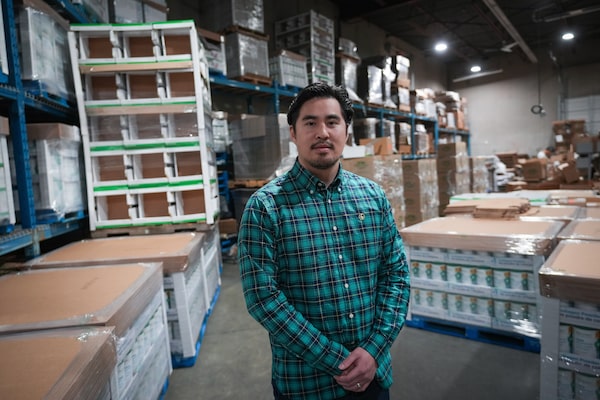
Organika CEO Aaron Chin poses for a photograph in Richmond, B.C., on May 6, 2022.DARRYL DYCK/The Globe and Mail
One of Aaron Chin’s fondest memories from his youth was being in Taiwan for New Year’s Eve and seeing an ad for his family’s company, Organika Health Products Inc., on the side of a city bus.
It was early in the Richmond, B.C.-based company’s foray into exporting, but he still remembers the pride he felt seeing the business flourish abroad. It felt like a long way from the company’s early days, when his father Tom was selling supplements out of the back of his van.
“It inspires me to be proud of who I am and what we’ve built as a family,” says Organika’s CEO, whose brother Jordan is president. “We want to represent Canada on the world stage.”
Tom Chin launched in 1990, after a bout with kidney stones left him looking for alternative treatments. The business has since grown to about 140 employees across Canada and its products are sold in 4,000 domestic retailers, including major chains such as Loblaws and Costco.
Organika has been exporting since 1996, but international sales have exploded since the brothers entered the picture around 2013, Aaron Chin says, adding that annual revenue has since increased to more than $70-million from $10-million. He’s expecting to surpass $100-million in 2023.
“Exporting has always been my dad’s vision from the very beginning,” says Mr. Chin, who lives in Vancouver. “His whole goal goes back to our mission … to help people live healthier. If there’s been interest from other markets on our products, we haven’t been shy about investing in infrastructure and relationships with distributors to grow our brand.”
Organika now sells its products in 26 countries, with particularly strong numbers in China, Japan, Taiwan and Eastern Europe. The company’s first step when expanding to a new market is researching whether there’s demand for the products and interest in a Canadian brand. Mr. Chin says the company’s domestic profile helps with its international reputation.
“A lot of companies say they’re Canadian and just launch in a different country but have zero presence in Canada.”
Once Organika has determined market interest, it typically partners with a key retailer or distributor in the target country, which helps access a customer base, and assists in creating locally focused marketing and navigating the local regulatory environment.
Complying with local regulations can necessitate changes to product packaging and testing regimes, Mr. Chin says. Organika will often tweak its products for a new market based on customer research.
“It might be a higher dose, liquid instead of capsules, or smaller sizes,” he says. “We really tailor it to that export market.”
Michel Mallou, who worked with Organika’s export team before leaving to start his own business, says many countries will not allow supplements to make health claims, which is something Organika has been able to capitalize on. Canada’s natural health products regulations allow such claims if the evidence supports it. However, “the type and amount of supporting evidence required depends on the proposed health claim of the product and its overall risks,” according to the government’s website.
Mr. Mallou, CEO of West Coast Link Marketing, which markets a Japanese natural health product in Canada, says Organika uses Canada’s reputation for having a strong regulatory environment as a business-to-business marketing tool. He says telling potential foreign distributors what Canada allows and the hoops companies must go through to make health claims helps provide a good impression of the products’ quality.

An Organika employee packs a customer's order in Richmond, B.C., on May 6, 2022.DARRYL DYCK/Handout
Organika has flourished in most countries it has exported to, but it isn’t a no-risk proposition. Its attempt to launch in Ghana didn’t take, Mr. Chin says, which he believes is because the company only launched one product, as opposed to a family of products, without a proper strategy.
China is Organika’s best market for international sales.
“We’ve done custom [products] for that country, as well as marketing on WeChat, Weibo, and all the Asia-specific digital platforms,” Mr. Chin says. “That has been really key to our success.”
The company is also looking to aggressively expand in the United States. Its products are currently sold on Amazon.com south of the border, as a “slight market test,” Mr. Chin says. He adds Organika plans to start selling through regional retailers in the U.S., with a goal to expand in the world’s largest economy at a sustainable pace.
“We know how big the [U.S.] market can be, so for us, it’s about making sure we have proper support in terms of our manufacturing, so we can scale up when needed.”
Organika has sourced potential new manufacturing space south of the border if sales skyrocket there. “There are potential lines that we can tap into if we need to move faster,” Mr. Chin says.
For other companies looking to follow in Organika’s footsteps, Mr. Mallou recommends getting involved with Canada’s Trade Commissioner Service. He says the organization can help provide funding and support for businesses to attend international trade shows or join a Canadian trade mission and also provides research aimed at helping firms better understand foreign markets.
“The government is very supportive of Canadian companies,” he says.
Our Morning Update and Evening Update newsletters are written by Globe editors, giving you a concise summary of the day’s most important headlines. Sign up today.